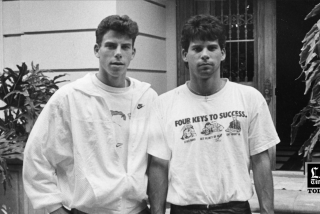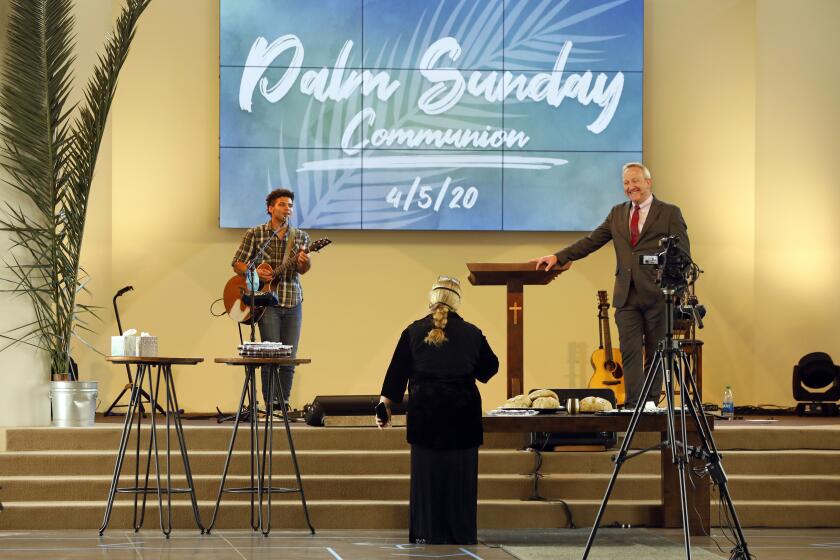To bring a boy’s murderers to justice, a prosecutor wrestled with his own childhood abuse
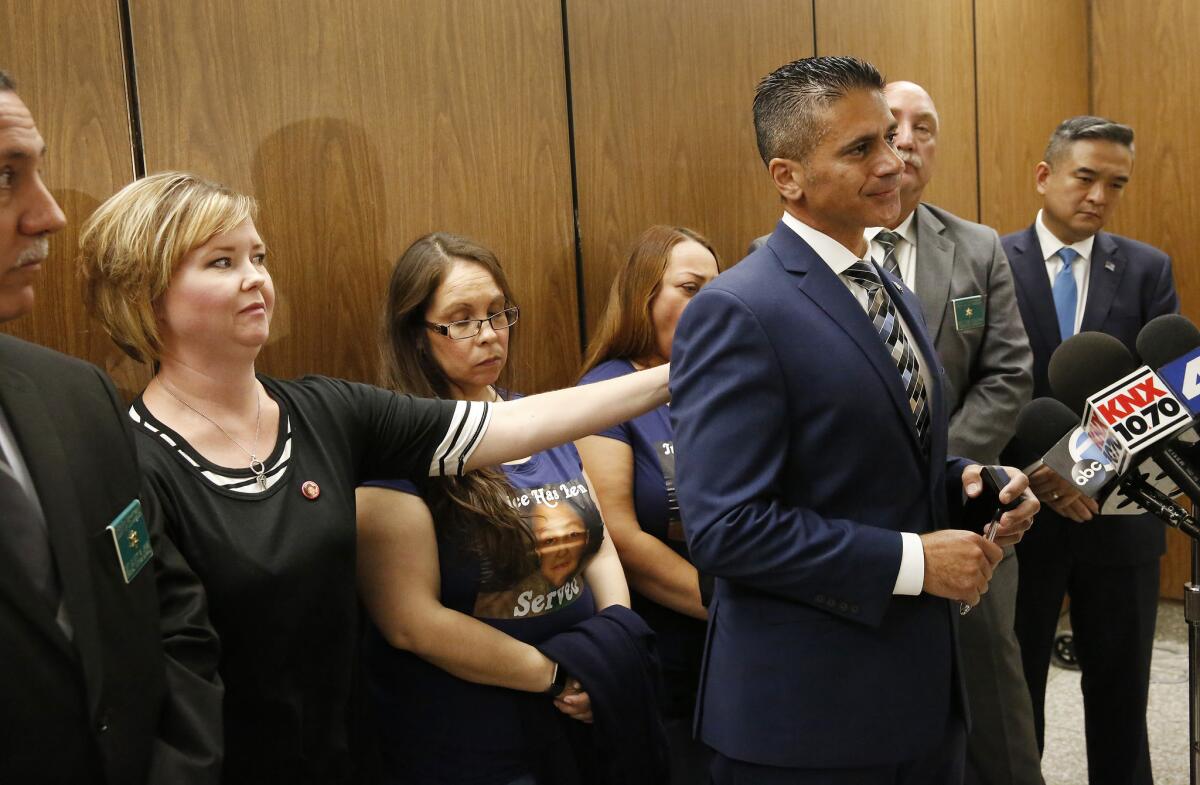
Jon Hatami’s voice shook and he stared down at the courthouse floor as reporters packed around him. Minutes before, the prosecutor had won a conviction in the killing of Gabriel Fernandez, one of the most infamous and chilling child abuse cases in California history.
When paramedics arrived at Gabriel’s Palmdale home in the spring of 2013, the 8-year-old had shattered ribs, a cracked skull and cigarette burns dotting his unconscious body, signs of the torture inflicted by his mother and her boyfriend.
After Hatami was assigned the case, he long guarded the gruesome details inside his mind, unable to speak publicly about the prosecution that had both infused him with deep purpose, but also strained his marriage and eroded his trust in law enforcement. In the fall of 2017, moments after jurors convicted the boyfriend, Isauro Aguirre, of murdering Gabriel, Hatami thought it was finally safe to unburden his heart.
During that emotional news conference, he stunned the crowd.
‚ÄúSorry,‚ÄĚ he said in a hushed voice, swallowing tears. ‚ÄúI was a victim of child abuse.‚ÄĚ
‚ÄúAt what age?‚ÄĚ a reporter shouted.
‚ÄúFour, five,‚ÄĚ Hatami answered, closing his eyes.
Reflecting on that episode now, Hatami described his public revelation as spontaneous ‚ÄĒ a split-second decision to highlight his own past. The 49-year-old prosecutor said that as a child, he was physically and verbally abused by his father and kidnapped and shuttled across the country by his mother, leading to years of emotional instability.
And he believes that his experiences and years of self-reflection make him uniquely equipped to prosecute child abuse cases.
‚ÄúIt‚Äôs my truth,‚ÄĚ says Hatami, who refers to himself an abuse survivor. ‚ÄúI know what it feels like to be powerless.‚ÄĚ
‚ÄėIt‚Äôs my truth. I know what it feels like to be powerless.‚Äô
— Deputy Dist. Atty. Jon Hatami
Prosecuting Gabriel‚Äôs case also reawakened some of Hatami‚Äôs own demons, pushing him to grapple with old memories and study his own psyche. His cases often involve cycles of abuse ‚ÄĒ Gabriel‚Äôs mother, for example, says she was sexually and physically abused as a child ‚ÄĒ and he knows that he inherited some of his father‚Äôs anger. He dreads the thought of treating his children the way his father treated him ‚ÄĒ of violating their trust, of instilling fear.
These days, when Hatami reflects on the verdict, his eyes well up. He felt such relief for Gabriel and his relatives: Finally, he thought, the system had done something for them. A few months later, in early 2018, Gabriel’s mother, Pearl Sinthia Fernandez, pleaded guilty to first-degree murder.
Raised Catholic and now Lutheran, Hatami sometimes thinks about Gabriel in heaven and wonders whether God or some spiritual force led the case to him.
‚ÄúI think I became a D.A. for that case,‚ÄĚ Hatami says, choking up. ‚ÄúI‚Äôll never have another Gabriel.‚ÄĚ
‚ÄėI was so small‚Äô
His father could be so fun, Hatami says, but small things ‚ÄĒ watching a TV show he didn‚Äôt like or eating food he deemed unhealthy ‚ÄĒ could set him off, and then his face would shrivel and flush red as he screamed. Sometimes his father slapped him, Hatami says. Other times he yanked him by his hair, smashing his small body into the white walls of their apartment in Queens, N.Y.
In one of his most distinct early memories, he’s standing inside a New York courtroom for a custody hearing and his father whispers in his ear, encouraging him to tell the judge he’d rather live with his father. Hatami remembers feeling terrified. He froze, unable to say a thing.
‚ÄúThe court was so big,‚ÄĚ Hatami says, ‚Äúand I was so small.‚ÄĚ
After the hearing, his mother, who’d been granted temporary custody, flew him and his younger brother to Florida, leaving them temporarily with an elderly woman who was a stranger to the young boys.
‚ÄúMy mother kidnapped my brother and I,‚ÄĚ Hatami adds matter-of-factly; he believes that his mother feared his father planned to flee with the boys to his native Iran.
In an interview, Hatami’s father, now in his 80s, acknowledges raising his voice to his son, but denies abusing him physically.
‚ÄúThat‚Äôs completely out of my character,‚ÄĚ he says, suggesting that Hatami might have imagined the abuse ‚ÄĒ details of which, however, were confirmed to The Times by another close relative who asked to remain anonymous.
‚ÄėI think I became a D.A. for that case. I‚Äôll never have another Gabriel.‚Äô
— Deputy Dist. Atty. Jon Hatami
Hatami’s mother did not respond to multiple voicemails or a letter seeking comment. The prosecutor’s father, as well as another close relative, confirmed Hatami’s characterization of his travels with his mother as a kidnapping.
Hatami says that the old woman in Florida, whose name he doesn‚Äôt know ‚ÄĒ ‚Äúthe lady,‚ÄĚ he calls her ‚ÄĒ often chased him around her single-story home whacking him with a wooden spoon. A few months later, he says, his mother returned and moved the boys to California.
His father eventually contacted New York police, the FBI and groups that help search for missing children, Hatami says, and photos of himself and his brother listed as missing children ran in an edition of Ladies‚Äô Home Journal. In the early 1980s, someone recognized them as the boys in the photos, and the prosecutor, then in his early teens, remembers federal officials coming to their North Hollywood home to question his mother. Ultimately, she got ‚Äúa slap on the wrist,‚ÄĚ he says, noting that parental kidnapping wasn‚Äôt taken as seriously back then.
Hatami enlisted in the Army at 18 and spent the next seven years bouncing from stint to stint across the globe. Although he didn‚Äôt talk about his childhood then, afraid that fellow soldiers might view him as weak, the structure of the military helped him process and direct his anger. The Army showed him the power of a long run ‚ÄĒ still his go-to stress reliever ‚ÄĒ and offered time for self-reflection.
‚ÄúI am good,‚ÄĚ he recalls telling himself for the first time in his life. ‚ÄúI am somebody.‚ÄĚ
Hatami later moved to Nebraska for law school and then returned to Los Angeles County in 2003 to work as a civil attorney. A year later, he wrote a letter to The Times responding to news of a Chatsworth teenager, who discovered while searching the internet that his mother had kidnapped him from his father’s home years earlier.
‚ÄúMy heart just goes out to that Chatsworth student,‚ÄĚ Hatami wrote, explaining that his mother had kidnapped him, too.
‚ÄėIn Gabriel‚Äôs shoes‚Äô
Two years later, he took a job with the L.A. County district attorney’s office, and eventually was assigned the case of a 7-year-old boy who, like Gabriel years later, was abused by his mother and her boyfriend.
During closing arguments at trial ‚ÄĒ his final words to jurors before they ultimately convicted the defendants of child abuse and torture ‚ÄĒ Hatami said that the boy, a weak swimmer, had flailed in the pool as his mother repeatedly shoved his small hand from the ledge. He got a bit emotional as he spoke, Hatami recalls, but it was so subtle that he doubts jurors noticed.
One of three prosecutors assigned to the D.A.’s complex child abuse unit, Hatami has had practice tamping down his emotions since then.
He says he can‚Äôt envision ever recusing himself from a case simply because it involved child abuse, even one as brutal and personally triggering as Gabriel‚Äôs. What Gabriel and other children have endured far exceeds what he himself experienced ‚ÄĒ ‚ÄúMost of my victims are dead,‚ÄĚ the prosecutor says.
And yet, the impact of his own abuse haunts Hatami’s adult life in ways he continues to unearth. For a long time, the concept of being either a dad or a husband terrified him. Could he truly trust somebody? Would a future wife ultimately remind him of his mother? And could he be a good dad?
‚ÄúI‚Äôm flawed,‚ÄĚ he often says.
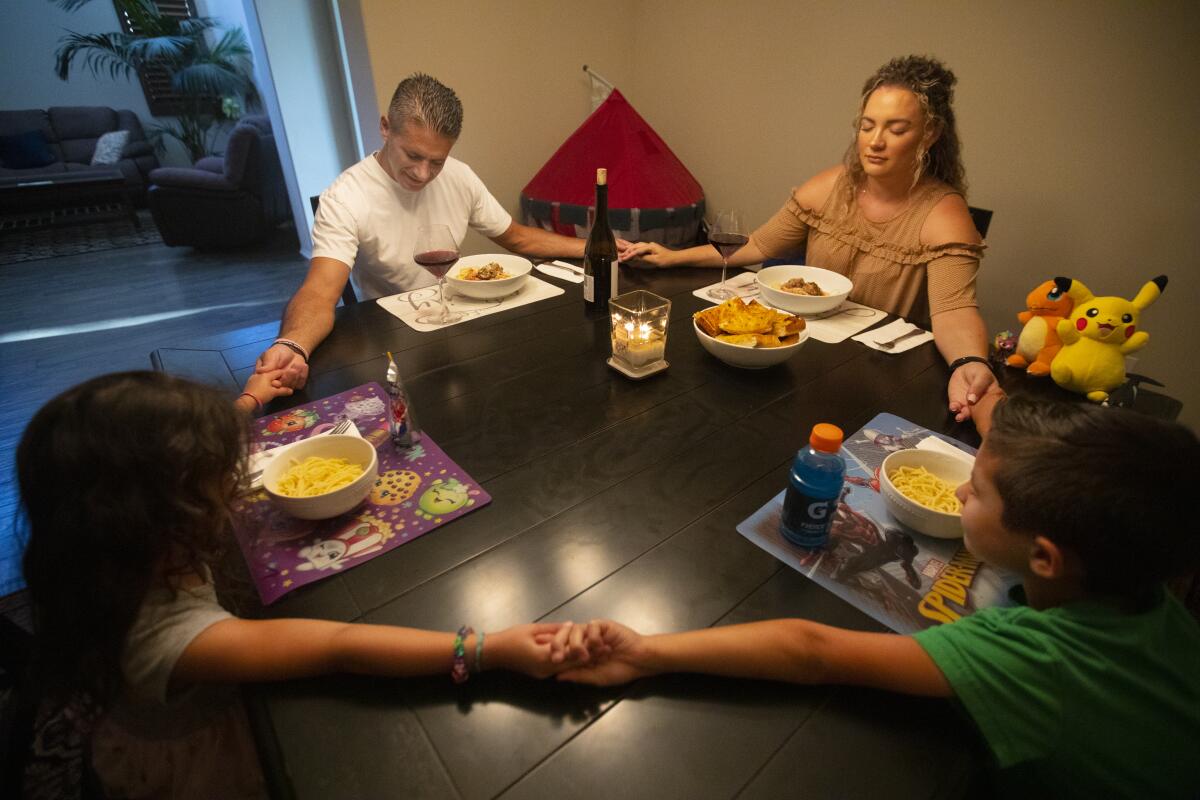
Hatami credits much of his personal growth to his wife, Roxanne, who once worked as a bailiff at the Antelope Valley courthouse. He proposed in the courtroom where they met and they married in 2011, when he was 40. Through the years, Roxanne ‚ÄĒ now a detective in the Sheriff‚Äôs Department ‚ÄĒ learned to gently point out when he snapped at her with a mean name during arguments. That‚Äôs hurtful, she‚Äôll say.
But yelling is a learned behavior, she knows, and one that takes time to unlearn.
‚ÄúThis is just kind of a product of what he‚Äôs left with, unfortunately,‚ÄĚ she says.
Gabriel died in May 2013 ‚ÄĒ six months after the couple‚Äôs son, Jonathan Jr., was born. Hatami spent long hours in the office, piecing together evidence of Gabriel‚Äôs last days. He studied X-rays of shattered ribs and thought of his own son, now a toddler, bumping into things at home. Small bones are pliable, he realized, and shattering them would take deliberate effort.
‚ÄėHe really had to put himself in Gabriel‚Äôs shoes.... In doing that, he sacrificed a lot of himself.‚Äô
— Roxanne Hatami
Some nights, while he was preparing to present the case to grand jurors, Hatami‚Äôs mind raced and he didn‚Äôt want to talk. Other times he and Roxanne ‚ÄĒ working full time and up many nights with Jon Jr. ‚ÄĒ bickered over small things.
‚ÄúOur home life was really kind of turned upside down,‚ÄĚ Roxanne recalls. Although her husband had discussed his abuse in broad terms years earlier, he opened up in much more detail while prosecuting the case.
‚ÄúHe told me that he really had to put himself in Gabriel‚Äôs shoes. Like, ‚ÄėHow did he feel?‚Äô‚ÄĚ Roxanne recalled. ‚ÄúIn doing that, he sacrificed a lot of himself.‚ÄĚ
The stress got worse, the couple said, after Hatami publicly challenged the L.A. County Sheriff‚Äôs Department ‚ÄĒ his wife‚Äôs employer and the agency that investigated Gabriel‚Äôs death. In a motion asking for an investigative file ‚ÄĒ critical evidence that Hatami says the department‚Äôs internal affairs division hid from him for years ‚ÄĒ the prosecutor alleged inaction by deputies who had responded to Gabriel‚Äôs home in the months before his death. Before long, Roxanne started hearing rumors about veiled threats from co-workers, and the couple lost some friends.
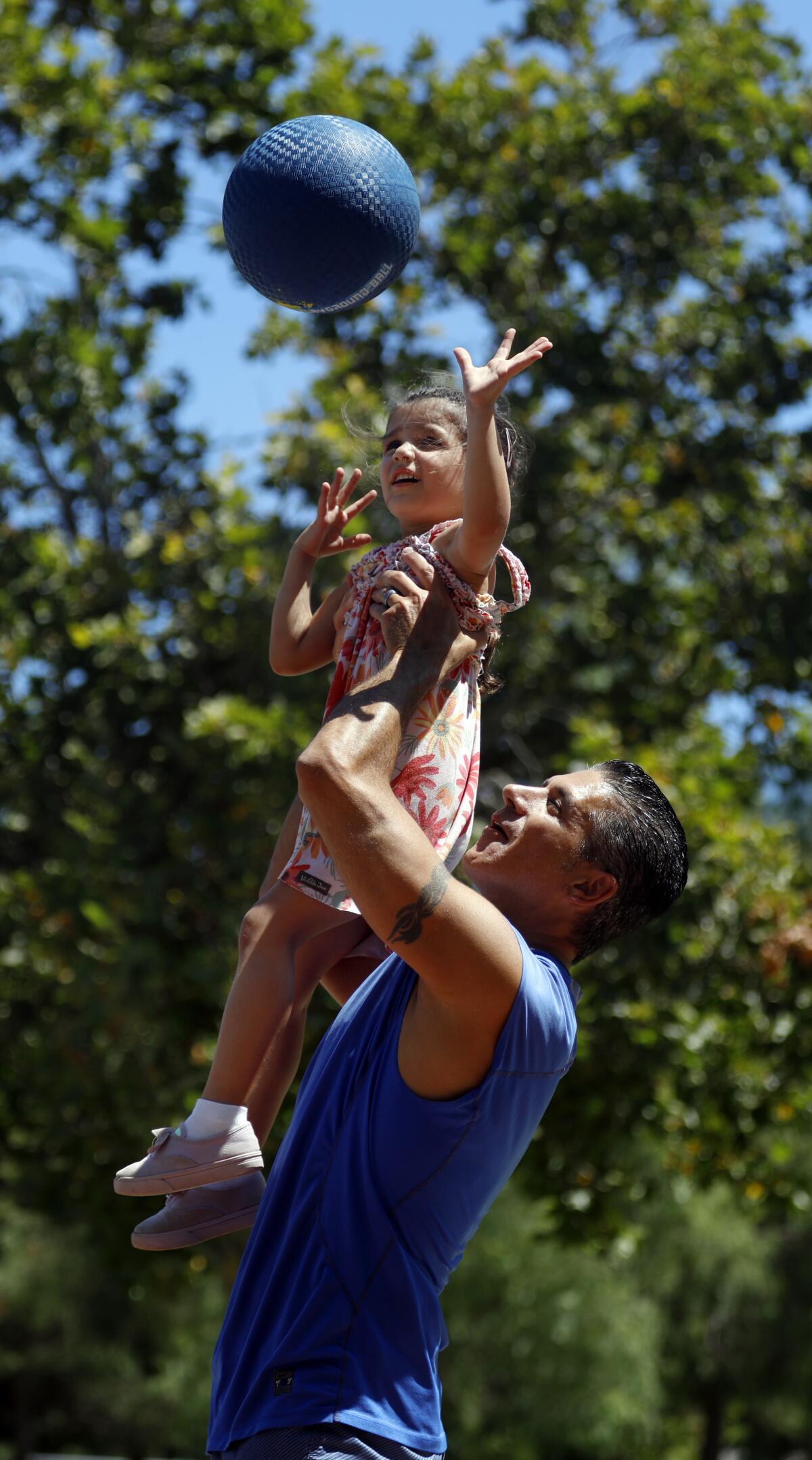
In the end, all the stress was vindicated.
‚ÄúThat case was so important. It was worth it,‚ÄĚ Roxanne said during a recent conversation in the kitchen of the family‚Äôs home in the Santa Clarita Valley. Down the hall, Hatami rolled a ball back and forth to Jon Jr., now 7, and their daughter, Lindsey Beth, 4, who had red dots of marinara sauce crusted into the corners of her smile.
A few minutes earlier, she sashayed over to her father and hugged his leg.
‚ÄúDid I do a good job with the pasgetti?‚ÄĚ she asked. He peeked over at her nearly empty pasta bowl.
‚ÄúYes,‚ÄĚ he said, smiling, ‚Äúyou did.‚ÄĚ
‚ÄúI‚Äôm the bestest!‚ÄĚ Lindsey Beth said, twirling.
Finally, a murder trial
By the fall of 2017, prosecutors had decided to try the defendants in Gabriel’s case separately. Fernandez ultimately pleaded guilty to avoid the death penalty, but Aguirre decided to take a chance before a jury.
At trial, Hatami spoke slowly while describing Gabriel‚Äôs torment. The little boy often slept in a cabinet with a sock gagging his mouth. Fernandez and Aguirre forced him to eat cat feces and his own vomit. Aguirre ‚ÄĒ who Hatami believes hated Gabriel because he suspected he was gay ‚ÄĒ lashed the boy with a metal hanger and beat him with a bat.
Moira Shourie, a media executive who served as the jury forewoman, focused on the way Hatami spoke about Gabriel ‚ÄĒ with such conviction that she assumed he‚Äôd known the boy personally.
‚ÄúHe really delivered Gabriel‚Äôs voice,‚ÄĚ she said. ‚ÄúHe spoke for the victim.‚ÄĚ
Jurors convicted Aguirre of first-degree murder after six hours of deliberations. A few minutes after the verdict was read, Hatami, elated and exhausted, walked toward the media scrum. He hadn’t planned to say anything about his own past, but it felt like a natural response to one of the questions.
Almost immediately, some of his bosses expressed concern about how the comments might hurt the case, and within days Aguirre‚Äôs defense team asked the judge to declare a mistrial and remove Hatami from the case, questioning whether he could be ‚Äúevenhanded.‚ÄĚ
The responses perplexed Hatami, who thinks it‚Äôs a farce to say that any prosecutor ‚ÄĒ or human, for that matter ‚ÄĒ goes into their job with a completely clean slate. Some prosecutors just keep their experiences more private.
‚ÄėHe really delivered Gabriel‚Äôs voice. He spoke for the victim.‚Äô
— Moira Shourie, jury forewoman
‚ÄúWe‚Äôre all humans; we all come with ourselves,‚ÄĚ he says, noting that, for him, speaking about his past is therapeutic. He also hopes to encourage other survivors and to remind them to hold no shame.
The judge ultimately denied the defense request for a mistrial and jurors voted to sentence Aguirre to death. After the death sentence was read, Hatami joined the jurors in the deliberation room and started to sob, bracing himself on the back of a chair.
A complicated love
Because of his own experience, Hatami understands behavior that some might find contradictory. It doesn‚Äôt surprise him, for example, that shortly before Gabriel‚Äôs death, the little boy wrote a note that said, ‚ÄúI love you mom and Gabriel is a good boy.‚ÄĚ
Although Hatami’s own parents have softened with age, and he has let both of them meet his children, the relationships remain deeply strained. He’s not sure he’s forgiven them, he says, but he does love them.
‚ÄúGod,‚ÄĚ he says, letting out a long sigh, ‚Äúit‚Äôs so hard to explain to people.‚ÄĚ
Even as he wishes for some profound apology, he still craves their approval. And, over the years, he’s taken steps to show them love.
In the summer of 2008, he said, he moved into his mother’s home for six months as she recovered from broken ribs sustained when an off-duty LAPD officer hit her with his Hummer then fled the scene.
Around the same time, Hatami‚Äôs father, who lives in New York, contacted him about changing the spelling of his last name, explaining that when he emigrated to the U.S., he‚Äôd imprecisely translated his name from Farsi to ‚ÄúHatemi.‚ÄĚ At his father‚Äôs request, the prosecutor said, he officially swapped out the E for a second A.
Asked about his father‚Äôs remark that Hatami might have imagined parts of his past, the prosecutor tightened his lips and shook his head. ‚ÄúMy imagination?‚ÄĚ he said, tears again welling into his eyes.
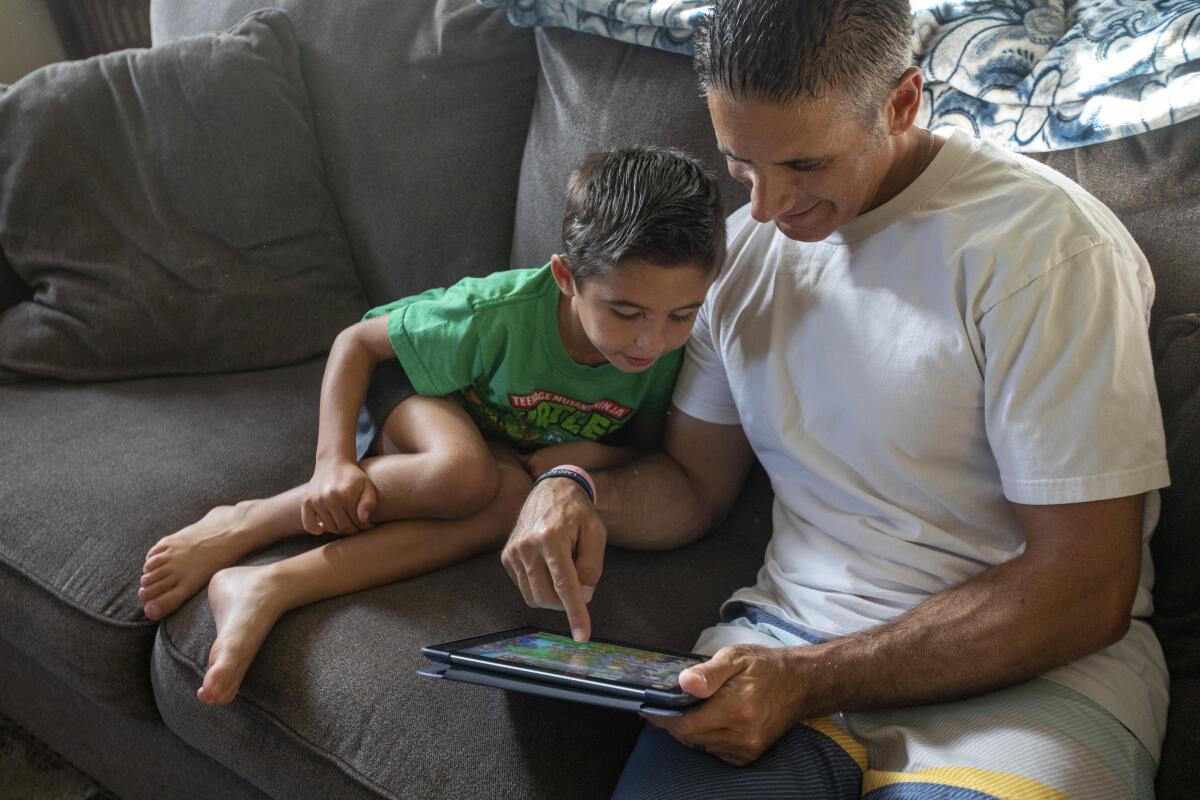
‚ÄúI know,‚ÄĚ he says. ‚ÄúI know, because I can be like him.‚ÄĚ
Back when he was prosecuting Gabriel’s case and his own son was younger, Hatami says, he recalls a time he lost his temper and yelled. In that moment, before his son burst into tears, Hatami stared into his son’s small, brown eyes and recognized the look of fear. He remembered the feeling of being so small.
Shattered, he hugged his little boy and told him he was sorry.
‚ÄúI‚Äôm not going to do that again,‚ÄĚ he said. ‚ÄúI love you.‚ÄĚ
‚ÄúOh, it‚Äôs OK, Dad!‚ÄĚ his son said. ‚ÄúI love you.‚ÄĚ
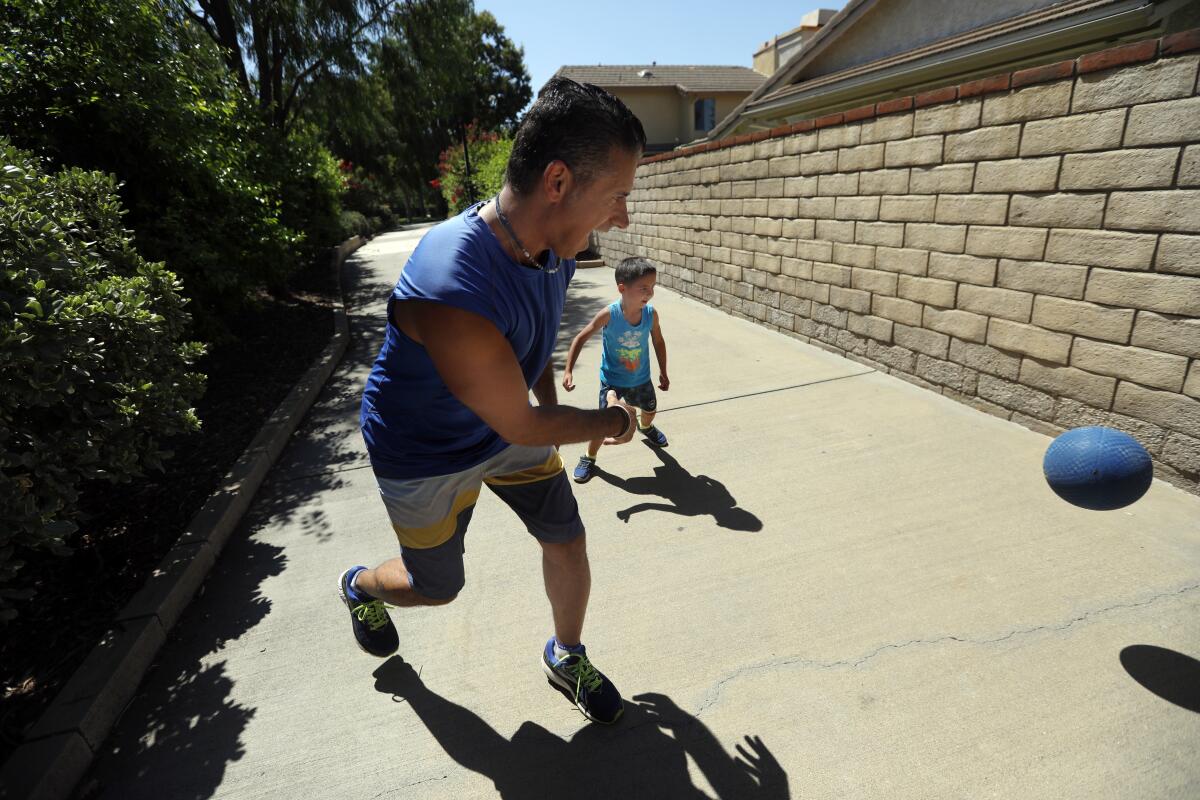
He works hard not to raise his voice now, and when he does he’s racked with guilt for days and rushes out to buy the children toys or candy or doughnuts. He now lets Roxanne handle all of the discipline.
One morning earlier this year, Hatami pulled up to Summerwind Elementary School in Palmdale in his F-150 pickup. Shourie and the other jurors had invited him to Gabriel‚Äôs old school for the dedication of a plaque. ‚ÄúIn memory of Gabriel Fernandez,‚ÄĚ it read, ‚Äúwhose smile and story touched 19 jurors.‚ÄĚ
Inside the gym, Hatami spotted a big banner of Gabriel wearing a brown fedora and a smirk. He sighed, wondering how much longer he could handle these cases. Hatami currently has 10 open child-abuse cases. As he stood there, he noted, authorities were searching a nearby landfill for the body of another little boy.
During the ceremony, Gabriel’s first-grade teacher shared memories of her former student and Hatami hunched forward, dabbing his eyes with a tissue. His shoulders bounced as he cried and Deputy Dist. Atty. Scott Yang, who prosecuted the case alongside Hatami, rested his left hand on his co-worker’s back.
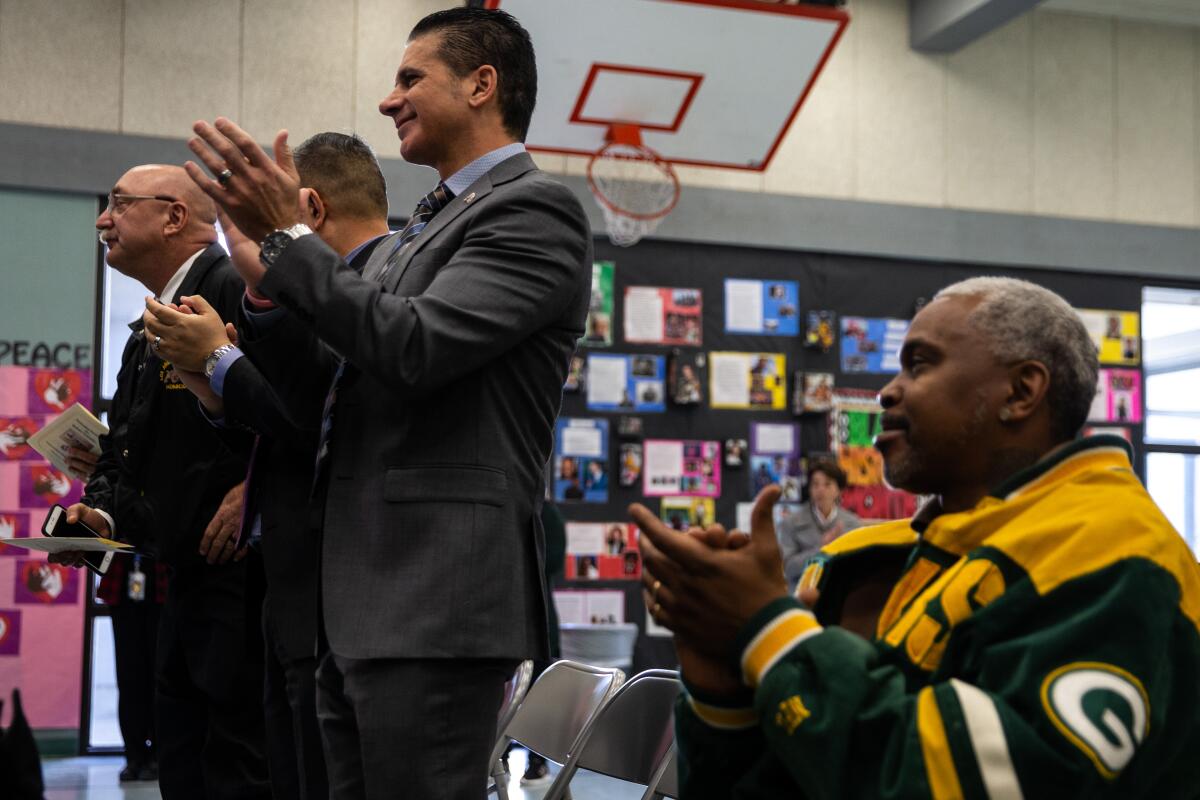
Moments later, a line of first-graders filed into the gym and sang for Gabriel.
‚ÄúYou can count on me, like one, two, three,‚ÄĚ they sang, signing each number with their hands.
The song ended and Hatami vaulted from his seat. For a moment, before the other adults joined the ovation, it was just him, standing and smiling, clapping and crying.
More to Read
Sign up for Essential California
The most important California stories and recommendations in your inbox every morning.
You may occasionally receive promotional content from the Los Angeles Times.

